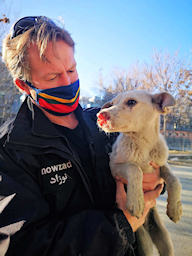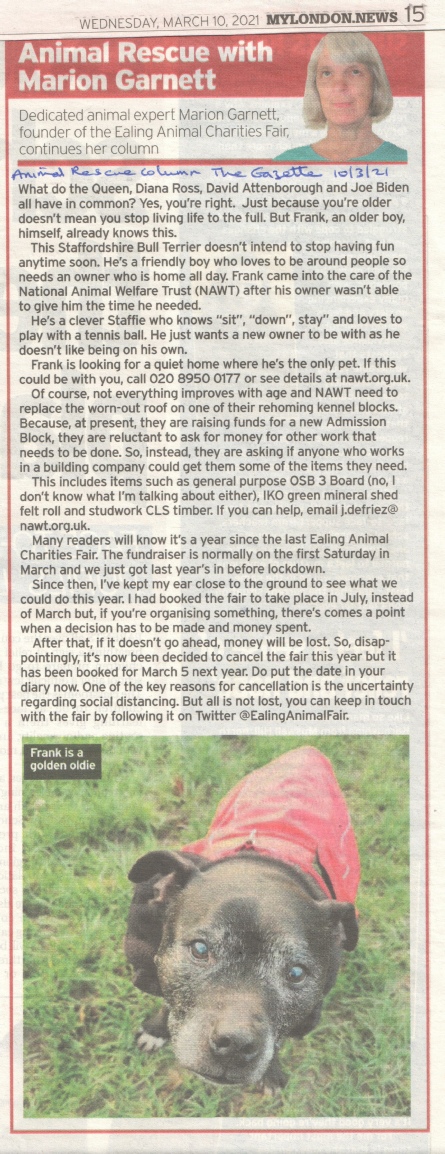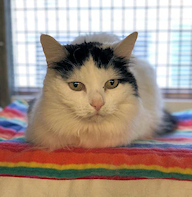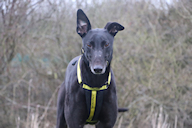






Although the information given here is, to the best of the organiser’s knowledge and belief,
correct, the organiser reserves the right to make alterations and amendments, as necessary.
As well as founding the Ealing Animals Fair, Marion Garnett has also, since 2011, written a weekly Animal Rescue column which is published in the West London local newspaper, The Gazette. Columns published since January 2019 are now available online here.
If you would like to see any of the columns published before 2019, please contact Marion directly (see the Contacts page).
When you open the fridge and find the brown sauce bottle is empty – there is no choice. Even in a war zone. A journey to the supermarket calls.
This is former Royal Marine Commando, Pen Farthing, best-
Thankfully for a young pup, it was a journey that meant Pen was exiting the Nowzad van just as the pup stuck its head out of the drain outside the supermarket where he was foraging for food.
Pen could immediately see the pup had an injury to its mouth. He approached it slowly so as not to scare it and quickly realised it was not an injury but leishmaniosis. A potentially fatal disease which needs immediate treatment. The pup was super friendly which meant Pen could scoop him up.
Once back at the Nowzad clinic in Kabul, the pup was admitted for treatment. Named Creamy, he was put in quarantine where he was desperate for a warm bed and food for his empty tummy.
Pen says that every now and then, Nowzad are reminded why quarantine is necessary. Just a few days after arriving at the clinic, Creamy started to act aggressively. He was showing the first signs of rabies. Within a few hours he was fully rabid.
The team acted swiftly and were able to painlessly end his suffering, thankful he had been saved from a difficult death on the streets where he may have bitten someone.
 Although Creamy was only with Nowzad a short time, he touched their hearts. He also
emphasised the need to expand their quarantine facilities so they can help more animals.
Although Creamy was only with Nowzad a short time, he touched their hearts. He also
emphasised the need to expand their quarantine facilities so they can help more animals.
If you want to know more about Nowzad’s work or donate for expanded quarantine facilities, go to nowzad.com or send a cheque to Nowzad, The Meriel Suite, Hartnoll Farm Business Park, Tiverton EX16 4NG. All donations are welcome but those who give over £200 will have their name or message displayed on the unit wall.
Just in case you’re wondering how those at the Kabul clinic are faring with the pandemic, Pen says there is little in the way of Covid testing and definitely no vaccine delivery on the horizon. They have little choice but to mask up and crack on.

I’ve just seen a notice on a hospital vending machine which says “Do not use endoscopy equipment to steal chocolate from this vending machine…next time the Police will be notified”.
Yes, this certainly was a crime but, for me, it’s not in the same league as the crime of leaving a cat taped up in a cardboard box beside a busy main road. But that is just what happened to Kitty.
This cat was abandoned at the entrance to the National Animal Welfare Trust (NAWT) rehoming centre. Importantly, whoever left the cat there didn’t realise that because of lockdown and visitors not being allowed into the centre, that entrance is, at present, hardly used. Staff go a different way. It was only by chance the cat was found when a member of staff was walking a dog who became interested in the box. Fortunately, Kitty is now in the safe hands of NAWT.
Let’s be clear about this, abandoning an animal in this way, is a crime. And, moreover, totally unnecessary. Jackie De Friez, manager of the NAWT centre emphasises that, if you can no longer keep your animal, all you have to do is give them a call and they will do all they can to help you. They won’t be judgemental.
When you take an animal into your home, the intention should be that it is for the rest of that animal’s life but, if circumstances change, rescue centres understand this.
NAWT is among several charities, such as Battersea Dogs and Cats Home (battersea.org.uk),
Dogs Trust (dogstrust.org.uk) and CatChat (catchat.org) which have on their website
what to do if you need to give up your pet. Once the decision has been made, you
need to contact a reputable animal rehoming centre as soon as possible as, although
the urgency of each case is likely to be considered individually, the animal may
have to go on a waiting list before it can be admitted.
(battersea.org.uk),
Dogs Trust (dogstrust.org.uk) and CatChat (catchat.org) which have on their website
what to do if you need to give up your pet. Once the decision has been made, you
need to contact a reputable animal rehoming centre as soon as possible as, although
the urgency of each case is likely to be considered individually, the animal may
have to go on a waiting list before it can be admitted.
The problem of what to do if, unexpectedly, you can no longer look after your pet highlights one of the advantages of getting a pet from a rescue centre. If you can no longer keep them, a reputable rescue centre will usually take them back.
Now back to beautiful Kitty. She’s friendly although rather timid. Kitty will be available for rehoming towards the end of March. If you’re interested in giving her a quiet, loving home for the rest of her life, call NAWT on 020 8950 0177 or see nawt.org.uk.
We’re waiting for the toads to arrive. Having spent several days during lockdown
creating a wildlife-
When creating something new like this, it’s useful to get advice from someone who knows what they’re talking about so I’ve been speaking to a gardener who has won seven gold medals at Chelsea for aquatic plants (watersidenursery.co.uk). Unbelievably helpful, she helped me avoid mistakes.
In order to avoid dog owners making mistakes when doing something new, Dogs Trust
are giving advice on how to bring dogs out of lockdown as smoothly as possible. Taking
the form of a roadmap, Dogs Trust’s advice includes how to prepare your dog for outdoor
gatherings (by, for example, reminding them how to greet people) and how to train
your dog for visitors indoors (by, for example, teaching your dog to run to a safe
space like their bed, when they hear the doorbell and wait there until your visitors
are settled). The Dogs Trust roadmap also emphasises that, as more people stop working
from home and return to their previous workplace, it’s important for owners to prepare
their dog to cope with being left alone, therefore preventing separation anxiety.
In order to stop problems developing, Dogs Trust invites owners to visit dogstrust.org.uk
to look at the roadmap and watch their training videos. One of the biggest reasons
why dogs are handed into Dogs Trust is because of behaviour-
Helped by Dogs Trust Harefield, one dog being prepared for new beginnings is Terry. This affectionate ex-
This affectionate ex-
Finally, Battersea Dogs and Cats Home are also trying something new. For two weeks, they are live streaming pictures from video cameras in their cattery. Research shows watching video footage of cute animals can help wellbeing. So, if your stress levels need reducing, try visiting battersea.org.uk and typing Cat Cam into the search box. Alternatively make a wildlife pond and wait for toads.
March 2021
| Groups 2025 |
| Map |
| Car parking |
| Subject Index |